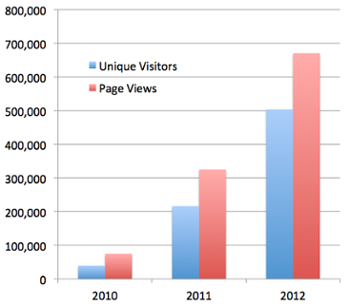Should Your Business Have a Blog and Use Social Media?

A magician doesn’t reveal his secrets, right? So why do those of us who blog and tweet successfully keep telling everyone else not only that they need to jump on the bandwagon but also how to do it. I’ve written a few articles here about blogging and social media and shown graphs of our tremendous growth in website traffic. But should you really bother? Do you need a blog? Is using social media mandatory?
A magician doesn’t reveal his secrets, right? So why do those of us who blog and tweet successfully keep telling everyone else not only that they need to jump on the bandwagon but also how to do it. I’ve written a few articles here about blogging and social media and shown graphs of our tremendous growth in website traffic. But should you really bother? Do you need a blog? Is using social media mandatory?
Only you can really answer that question. I’ll tell you a bit about why it might make sense and why I think it works for us. Of course, along with the benefits come a few drawbacks.
The case for blogging and social media
If you’re not fully committed to blogging and social media yet, here are a few reasons why you might want to jump in. Some of these come from an article about blogging I read recently. Others are my own.
- Your competitors are doing it. People go online to find the information they need now, and they often look for information before products or services. If your competitor’s blog is in their search results and yours isn’t, you’re missing out.
- A blog is a virtual salesperson. When you publish an article and include a call-to-action, it’s sitting out there in cyberspace working for you all day, every day.
- Show your expertise. With articles that answer your readers’ questions, you show that you know enough to get their business.
- Get better results than Google Adwords. A good blog will lead to better traffic and leads than spending money on ads. We did Adwords for a while and found that it resulted in low quality leads that we had difficulty converting.
- Your traffic could go through the roof. That’s been the case with the Energy Vanguard Blog. I began writing it nearly three years ago and was getting almost no traffic at the time. The chart below shows the results.

The case against blogging and social media
It’s not all rosy, however. If you’re not involved with blogging or using social media for business yet, be aware of the drawbacks.
-
It takes a lot of time. I’ll admit that I spend a lot of time doing this. It takes me anywhere from 30 minutes to 5 hours to write one article. Then there’s the comments that I try to respond to (and am doing less and less of because of lack of time). Then there’s using social media to promote not only my stuff but a lot of other stuff because nobody wants to follow someone who promotes only their own stuff. Then there’s the time monitoring traffic, tracking articles, and making sure everything is working right in the background. Then there’s… The list goes on and on.
- Not everyone is a writer. Writing comes easily to me. I enjoy it. I have fun with it. Once I started blogging, I knew it was for me because it feels so natural. Some people struggle mightily with writing, though, and if it becomes an activity you loathe, that will affect your results. You don’t have to be a great writer to blog effectively. You do have to enjoy it because that comes through.
- Your competitors are doing it…better than you ever could. Hey, sometimes you have to admit defeat and move on to something else. It’s always good in business to know what your strengths and weaknesses are and act accordingly. Einstein said something once that applies here: “Everybody is a genius. But if you judge a fish by its ability to climb a tree, it will live its whole life believing that it is stupid.”
And a few tips…
As with any practice, knowing how to do it properly is essential. Whether you’re a home energy pro, an interior designer, a chef, or a juggler, you need to study and practice and keep on working on your skills. Here are some of the things I’ve learned:
- Use a good blogging platform. Don’t use one that you won’t get credit for. If your business has a domain name (like energyvanguard.com), you want to get the credit for it so make sure the blog lives there, not at one of the many free blogging platforms like blogspot or wordpress.com. We use HubSpot, but home energy pros should definitely consider Energy Circle Pro.* Not only do they know this industry, but they have a really nice platform at a great price. If they’d been offering this service when I started this blog, I would have used them instead.
- The key to social media is interaction. Unless you’re already hugely famous, you’ll have to work to be successful at it. If you haven’t read it yet, make sure you check out Chris Brogan’s article, How To Manage Twitter.
- Show the real person behind the words. Social media doesn’t work very well without the ‘social’ part.
- Don’t sub out your blogging and social media. In some cases, that may be an effective strategy but generally not for small businesses. If your Facebook, Twitter, LinkedIn, and Google+ updates are from someone in the company who knows what’s going in, they’ll be more effective.
- Read, study, watch. You can find thousands of articles and other resources online that will help you understand how to use blogs and social media effectively. You should also observe those who are successful and see how they do it.
- Have fun! Your attitude will show through, and if you’re having fun, people will enjoy your blog posts and social media updates.
I don’t believe that blogging and social media are mandatory for every small business. You’ve got limited resources, and you have to make the best use of them. Maybe blogging and social media aren’t for you, but you’re great at making videos and marketing through YouTube. Maybe your business is very local and does better with a more personal approach. Maybe you just need to put together a really good Adwords plan.
These Internet tools can certainly do a lot for your business if you exploit them well, but as with most things, what you get out of it is proportional to what you put into it. You’d be better off using traditional marketing than having a blog full of crappy content. Go with your strengths.
*Disclosure: We do get a small commission when Energy Circle connects people who sign up with them to referrals from Energy Vanguard. Generally, this happens when we refer our students and HERS raters. Here, I’ve provided the link to their main page, however, and not to our referral page. Also, I wouldn’t refer people to companies that I don’t trust and wouldn’t use myself.
Related Articles
11 Secrets to Blogging about Building Science (or Any Topic, Really)
How I Use Twitter – A Social Media How-To for Home Energy Pros
Building Science Blogger Reaches Crazy Milestone on Special Day!
Photo of Merlin the Magician by Rafael Amado Deras from flickr.com, used under a Creative Commons license.
This Post Has 4 Comments
Comments are closed.

Very nice summary, Allison.
Very nice summary, Allison.
One question I have is whether your point #4 about Google Adwords came directly from your own experiences with EnergyVanguard marketing efforts, or if it came mainly from your cited source.
I tend to agree with the conclusion itself, but supposedly, there’s some sweet spot/tradeoff between organic traffic and Adwords (paid) traffic that one is supposed to strive for (albeit, far from me to be able to say what that tradeoff is; I’d imagine it depends on many factors and needs to be arrived at over time on an individual basis).
Also, success there depends directly (or mostly) on your point #1 below, under “And a few tips…”. I know you know that, but I didn’t feel the connection was emphasized strongly enough — that one of the main benefits of a blog is that it exposes your main business site to higher organic (non-paid) search rankings, assuming your blog address is a part of your main site’s domain (in addition to, of course, a whole slew of other factors too detailed to go into here).
Otherwise, this is a really great summary!
– John
John P.:
John P.: Thanks! Yes, what I said about Adwords is based on our experience. I know it can work because a lot of businesses are using it successfully. I added a little summary at the end of the article in which I suggested that Adwords may be the way to go.
As with anything, though, it takes work. I read about one company that was making tons of money by using Adwords, but then they suddenly lost almost all of it because of slight changes in Google’s algorithms that they didn’t catch in time. You’ve got to follow what Google’s doing and keep tweaking your plan to keep the bottom from falling out if you go that route.
Allison Thank you for the
Allison Thank you for the article, we do not have a blog yet — it looks like a lot of work. It took us two years just to get our new website up. It is still not all we want, but it is much better. I came up for the first time last week. I hope you and your readers can take a look at it. http://www.proctoreng.com
Thank you
John Proctor
John Proctor: Not everyone needs a blog, so don’t feel like you have to add that. You’re one of those people who’s probably famous enough not to need one. Optimizing your website for search engines without a blog can still bring a lot of traffic to you, and you’ve got a lot of info that you could make available. Building Science Corporation doesn’t have a blog either, but they put a ton of free info on their website and update it regularly.
I took a look at your new site at proctoreng.com, and it looks great. I like the research section and hope that you’ll add a lot more content there.